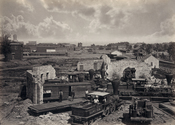Margaret Mitchell's romantic epic, Gone With the Wind, owes its remarkable popularity to the climate of sudden self-destruction the Depression created. The Old South's grandeur coupled with its Civil War-era decadence provided much-needed escapism for readers. In addition, Scarlett O'Hara's feminist role, her devotion to her land, and her indomitable optimism lent hope to those who had lost faith in the American Dream.
"Spring had come early that year, with warm quick rains and sudden frothing of pink peach blossoms and dogwood dappling with white stars the dark river swamp and far-off hills. Already the plowing was nearly finished, and the bloody glory of the sunset colored the fresh-cut furrows of red Georgia clay to even redder hues." (10) The foreshadowing of the "bloody glory" of sunset is striking, but idealism is the main theme presented here. Scarlett's status as a second-generation immigrant adds further to this atmosphere of opportunity.
Her father, a proud Irishman, proclaims "'Land is the only thing in the world that amounts to anything, for Oetis the only thing in this world that lasts... .And to anyone with a drop of Irish blood in them the land they live on is like their mother.'" (39)
The South's economic dependency and lack of stability, as well as its overconfidence, mirror that of the late 1920s U.S. Indeed, the Yankees do lick the Confederates, albeit in more than forty-eight months. The landscape is much changed. "Atlanta was no longer...the desperately gay place she had loved. It was a hideous place like a plague-stricken city so quiet, so dreadfully quiet after the din of the siege." (341)
But reaffirming the hope of the disenfranchised is Scarlett and her determination to resurrect her homeland. "She could not desert Tara; she belonged to the red acres far more than they...



Gone with the wind
Loved the film and loved this. Well done.
1 out of 1 people found this comment useful.